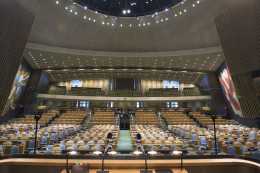By Sarah Ganter
By Bodo Ellmers
In late January, United Nations (UN) Secretary-General António Guterres sent a dramatic letter to UN Member States warning about the “imminent financial collapse” of the United Nations Organization. The letter followed earlier warnings that the UN Secretariat might have to reduce expenditure from the regular budget by 15 percent in 2026. This would mean reducing the workforce by about 2,600 staff.
By Sarah Ganter
Billionaires often pay less tax than the middle class. Not for technical reasons, but because there is a lack of political will to change this. It is a question of fairness. And a question of democracy.
French economist Gabriel Zucman is one of the most internationally renowned researchers on tax justice and wealth concentration. For years, he has been demonstrating how extreme wealth systematically evades taxation. The consequences are clear: governments lose billions in revenue, societies lose faith in equality before the law, and democracies lose their scope for action.
This trend is also [...]




